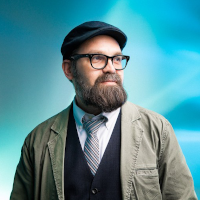Surveillance Aesthetics: Provocations About Privacy and Security in the Digital Age Autumn 2021
Description: In the modern world, individuals' activities in both the physical and digital worlds are tracked, surveilled, and computationally modeled to both beneficial and problematic ends. Working jointly with students and faculty from the School of the Art Institute of Chicago (SAIC), this course will examine privacy and security issues at the intersection between the physical and digital world. Coursework will encompass both technical problem sets with substantial programming components and the creation of a capstone interactive art installation following the studio art process. The course will introduce algorithms for processing and modeling various types of data: (i) mobility data; (ii) video data; (iii) audio data; (iv) natural language data; (v) structured information archives. Through both the lenses of computer science and studio art, students will be asked to design algorithms, implement systems, and create artworks that communicate, provoke, and reframe pervasive issues in modern privacy and security. The course will both unpack and re-entangle computational connections and data-driven interactions between people, built space, sensors, structures, devices, and data. Synthesizing technology and aesthetics, the collaboration between UChicago and SAIC will communicate its findings to the broader public not only through typical academic avenues, but also via provocative and compelling public art and media.
Instructors
Course Staff
Office Hours
- Blase: By appointment
- Arthur: Mondays 4:00 - 5:00 on Zoom (see Campuswire for the link) and by appointment
Course Information
| Prerequisites | A previous course in computer security or privacy, such as CMSC 23200 or CMSC 23210 or CMSC 25900 or CMSC 33210 or CMSC 33250 or CMSC 33251. |
| Class Meetings | We will be meeting in person on Mondays and Fridays from 1:30p - 2:50p. If you are unable to meet in person due to illness, personal emergency, or potential covid exposure, please let Blase know, and he'll set up a Zoom link so that you can join that class virtually. | Relationship Between UChicago and SAIC Cohorts | We will be meeting on Mondays 1:30p - 2:50p as a UChicago (CS-only) cohort at UChicago in Ryerson 176. We will be meeting on Fridays 1:30p - 2:50p as a joint UChicago-SAIC cohort. The joint meetings will sometimes take place virtually (UChicago students meeting in person at UChicago in Ryerson 176, SAIC students meeting in person at SAIC), although we will sometimes meet jointly (either at UChicago or SAIC). Meetings at SAIC will be in Room 1407 of the SAIC Sullivan Center at 36 S. Wabash Ave. in the loop. Please take the elevator to the 14th floor vestibule and then let Blase know to let you in through the locked doors you will encounter at that point. The SAIC cohort meets twice as long as the combined cohort on Fridays (1:30p - 4:30p), and UChicago students are welcome, but absolutely not obligated, to stay longer on Fridays. This extra time is typically unstructured time for instructor critiques of projects. Staying longer on Fridays will have no bearing on your grade; instead, think of it as an extra opportunity for office hours. |
| Textbook | We will not be using a textbook, but rather reading papers published in recent computer science conferences, learning about art projects, and reading news articles. |
| Coursework |
The coursework for this class consists of five programming assignments (in the first five weeks of the class) and a capstone interactive artwork. There are no exams. Programming assignments will ask you to engage with both algorithmic and creative aspects of five different types of data: (i) mobility data; (ii) video and audio data; (iii) sensor data; (iv) natural language data; (v) structured information archives. We have designed these assignments to provide you depth in terms of the technical details of computing on these various types of data, but also to give you the opportunity to think about how to frame and communicate this data creatively. Programming assignments will be graded on both technical and aesthetic qualities, but with the weight on the former. The cornerstone of this class, however, will be the creation of an interactive artwork. You can either create this artwork alone or (highly encouraged) in a cross-disciplinary team with one of the MFA students from SAIC. Joint projects between UChicago and SAIC students will receive additional material resources (four times what a single project would receive). The form this artwork takes can vary based on student interest, ranging from an interactive installation to light/sound to screen-based. |
| Communication |
We will update the course schedule regularly throughout the course. All assignments will be distributed and collected on Canvas. If you have multiple files, you may upload them individually or as an archive (zip, tar, etc.). We'll use Campuswire for questions about the CS-only course material, CS-only logistics, and questions about CS-oly assignments. Please try to keep all course-related communication to Campuswire rather than email to facilitate coordination among the course staff. If you need to reach out to the instructors (e.g., pertaining to an illness or other events that might be impacting your performance in class), please make a post on Campuswire visible only to the instructors. Please be sure to use the "Extension request" tag on Campuswire for any requests for extensions (see "Late Policy" below for further details). In addition, please use the "P/F request" tag on Campuswire to request to take the class pass/fail (see "P/F Grading" below for further details). Obviously, post both types of requests as private, visible only to the course staff. We'll use Slack for communication across the UChicago and SAIC cohorts, discussion of your capstone artworks, and for sharing links to projects of general interest to the combined cohorts. |
| Late Policy |
We will accept assignments up to 24 hours late with a 15 point grade penalty. Assignments more than 24 hours late will not be accepted without a previously approved extension. Of course, in exceptional circumstances related to personal emergencies, serious illness, wellness concerns, family emergencies, and similar, please make the course staff aware of your situation and we will do our best to find a mutually agreeable solution, such as an extension. We do not consider job interviews, midterm weeks in other classes, or non-emergency travel to be exceptional circumstances. |
Grading
Your course grade will be calculated as follows:| Total | |
|---|---|
| Capstone Artwork | 50% |
| Assignments (5) | 40% (8% each) |
| Participation in Lectures/Discussions | 10% |
P/F Grade Policies
As outlined in UChicago's policy, this course may be taken pass/fail (P/F). Students who wish to take the course pass/fail, instead of for a letter grade, must make a Campuswire post with that request by the end of Week 9. A grade of P will be given to students who would have earned a C- or better in the course if it were taken for a letter grade.Academic Integrity Policies
The University of Chicago has formal policies related to academic honesty and plagiarism, as described by the university broadly and the college specifically. We abide by these standards in this course. Depending on the severity of the offense, you risk being dismissed altogether from the course. All cases will be referred to the Dean of Students office, which may impose further penalties, including suspension and expulsion. If you have any question about whether some activity would constitute cheating, please ask. In addition, we expect all students to treat everyone else in the course with respect, following the norms of proper behavior by members of the University of Chicago community.Student interactions are an important and useful means to master course material. We encourage you to discuss the material in this class with other students and to form study groups. It is totally acceptable to discuss assignments in general terms, such as discussing and sketching out the general approach to an assignment on a whiteboard (or the virtual equivalent thereof). However, it is not acceptable to show someone else your code, nor to look at someone else's code, even over screensharing. Similarly, it is not acceptable to turn in someone else's writing or code (or fragments thereof) as your own. When the time comes to write down your answer, you should write it down yourself from your own understanding.
Moreover, you must cite any material discussions you had with another student in the course or any written sources you relied on in non-trivial ways when working on an assignment. That is, at the top of each assigment submission, you must include a list of all other students with whom you discussed the assignment and all resources (e.g., URLs of webpages) that directly influenced your general solution. For example, "I discussed this assignment with Jane Smith and John Doe. I consulted https://www.helpfuldomain.com/helpfulpage.html to learn about the JavaScript event loop." You do not need to cite discussions with the instructors or TAs, nor do you need to cite anything from our course Campuswire page. You also do not need to cite the course slides or any other readings/materials we provide to you. If one student "helps" another by giving them a copy of their assignment, only to have that other student copy it and turn it in, both students are culpable.
Furthermore, if you are reusing short code snippets fairly verbatim (e.g., from a tutorial) for a small section of your assignment, that is fine, but you must indicate the source (e.g., URL) as a comment in your code at the place where you are reusing code. Failure to attribute code reuse as a comment in your code where a code snippet from a tutorial, StackOverflow, or similar is being reused is a violation of our academic integrity policy. You should not be reusing code snippets for a substantial fraction of your assignment. As a rule of thumb, if more than 5 lines of code are taken mostly verbatim from a given source, you are probably violating the academic integrity policy and should check with the course staff (in a private Campuswire post) about this code reuse well before the assignment deadline.
In general, for any specific questions you have about why your specific approach to a problem isn't working (and definitely for any post that includes your own code), you should default to posting privately to the course staff on Campuswire. If you have more general clarification questions or comments about assignments that don't include code snippets, please post publicly on Campuswire.
If you have any questions about what is or is not proper academic conduct, please ask an instructor. Please note that we are personally willing to pursue cheating cases and have done so in the past. Finally, note that this description of academic honesty is derived in part from policies written by Stuart Kurtz and John Reppy.
Wellness
If a personal emergency comes up that might impact your work in the class, please let Blase know in a Campuswire post visible only to the instructors so that the course staff can make appropriate arrangements. University environments can sometimes be very overwhelming, and all of us benefit from support during times of struggle. You are not alone. There are many helpful resources available on campus and an important part of the college experience is learning how to ask for help. Asking for support sooner rather than later is often helpful. If you or anyone you know experiences any academic stress, difficult life events, or feelings like anxiety or depression, we strongly encourage you to seek support. The University of Chicago's counseling services are here to support you. Consider also reaching out to a friend, faculty or family member you trust for help getting connected to the support that can help.If you or someone you know is feeling suicidal or in danger of self-harm, call someone immediately, day or night:
• Student Counseling Urgent Care: (773)702-9800 or in person.
• National Suicide Prevention Lifeline: 1-800-273-8255


